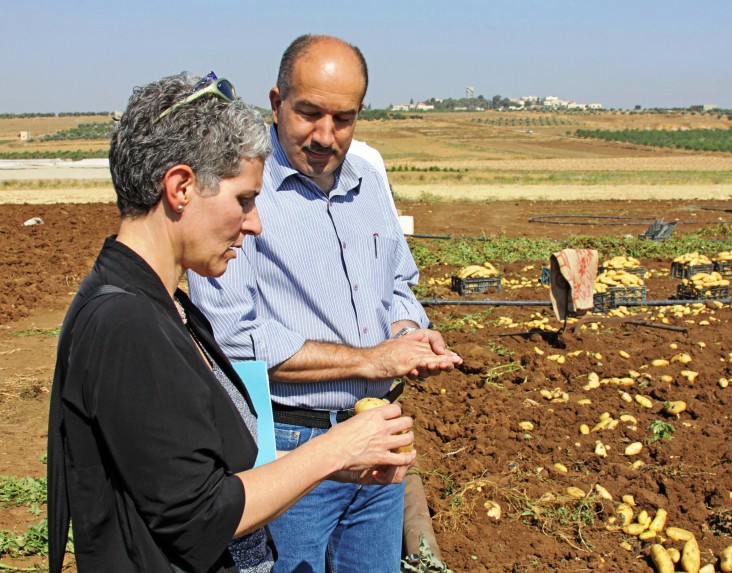
A Palestinian farmer explains to USAID's Mara Rudman the difference between regular potatoes and those grown for Al Salam
Lubna Rifi, USAID
USAID Links West Bank Business with Local Farmers
Smaller than Delaware, hilly and mostly arid, the West Bank is a challenging place to be a farmer. But for thousands of years, Palestinian farmers have shown that where there is a will, there is a way. Given the conditions, their profit margins have been slim.
USAID is working with Palestinian agricultural producers and agribusinesses to identify opportunities to increase those profit margins at all levels from field to fork. One such opportunity, in which local farmers are adjusting the varieties of vegetables they grow to best meet the needs of a frozen food processor, has the potential to create almost 500 additional jobs in the farming sector and generate more than $1.8 million in annual revenues for the farmers.
Al Salam Group in Hebron is the largest frozen food processor in the West Bank. Until now, it hasn’t been able to source its vegetables locally from Palestinian producers because the varieties these farmers traditionally grow are not well suited for freezing. In the case of potatoes, the local varieties absorb too much oil to keep Al Salam’s popular French fries crunchy and tasty.
USAID experts identified this as an opportunity to help Al Salam and farmers alike, serving as a bridge between potato farmers in the northern West Bank and Al Salam. The Agency helped the parties come together to reach agreement on growing a type of red potato called “Desiree” that is perfect for frying, as well as on pricing and quality.
The Agency then committed to partnering with the farmers to plant and monitor a demonstration plot using this variety of red potato. After testing the demonstration potatoes to make sure they met the necessary standards, the farmers, USAID and Al Salam have agreed to partner on planting potatoes in an area ten times the size of the original plot next season. Already, Palestinian farmers have delivered the first 160 metric tons of Desirees to Al Salam.
"Our relationship with Al Salaam has opened new business opportunities for us, which will allow us to improve the quality of our crops as well as plant new industrial varieties required by the corporate market," said Mohammad Daraghmeh, a farmer from Jenin.
USAID is now working to help Al Salam partner with other farmers to grow varieties of corn, green beans, onions, garlic, peas, herbs, and strawberries that can then be processed for sale in local and regional markets throughout the year. The planned expansion to other crops will put an additional 164 hectares of uncultivated land into production. It will help Al Salam significantly expand its business and, most importantly, create hundreds of jobs.







Comment
Make a general inquiry or suggest an improvement.